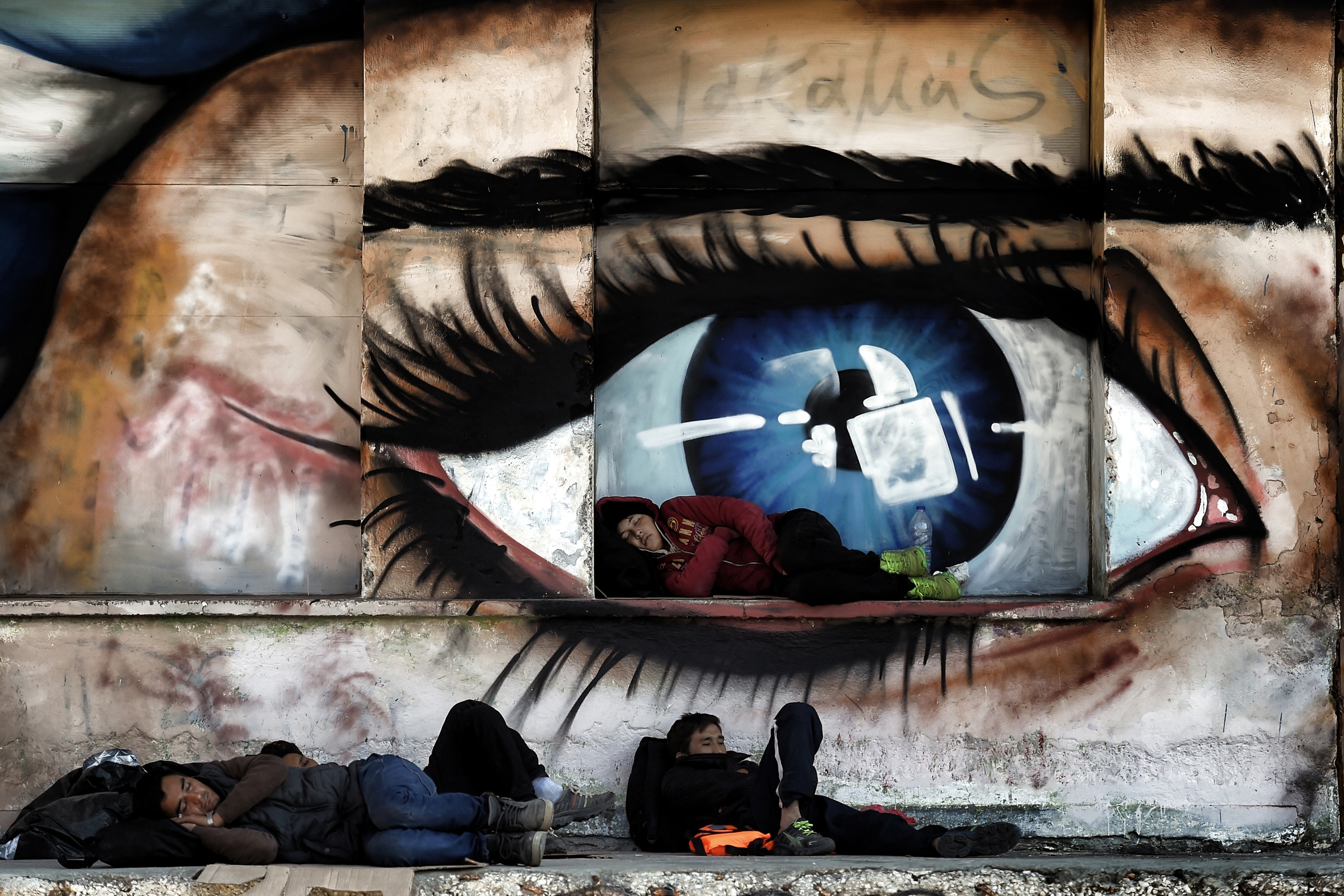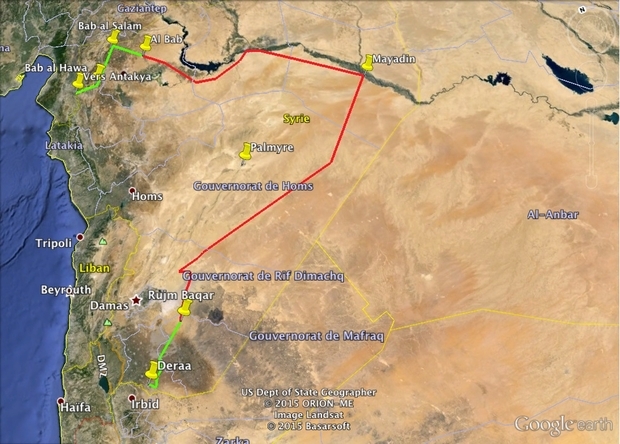A Syrian's journey along the riskiest road to exile

The phone rings as expected. Rafiq is on the line, talking with confidence. He is a veteran of the Free Syrian Army (FSA), a group of defected Syrian Army officers and soldiers, based in the region of Deraa in the south of Syria. He has just arrived in Germany with his wife and two kids after a month-long journey, including 10 days through the Syrian chaos. They have been running blindly between the thunderous sounds of war and the various illegal smuggling networks.
“My family didn’t want me to leave. My own mother called me ‘mad’. She said I had no rights to risk my children’s lives like that," says the former soldier. "However, every single day in Syria, women and children die under the bombs. My youngest daughter was witnessing death on a daily basis," he adds with a trembling voice.
Most of the time, the trip for Syrians begins in the city of Deraa, located not far from the border with Jordan. First, all refugees are gathered up by the FSA. There are among them Syrian people who took refuge in Jordan and who, after a while, found themselves unable to cope with the living conditions there and decided to go to Europe. Most of the time they are sought by the Syrian authorities and have no legal documents so they cannot fly to Turkey so they travel by land. Others have stayed and witnessed the war in Syria since it broke out, but the death of a relative, fear, or just disillusion finally lead them to risk it.
Every single one of them have to pay a $400 "down payment" to the FSA, which is divided between them and smugglers. Refugees are then brought to Sweida, a neighbouring region in the east. For those exiled people, close to the Syrian opposition, the name Sweida triggers terror. This mountainous region, entirely controlled by the Assad government, is indeed for them a symbol of the brutal army repression after the insurrection.
“They couldn’t care less about your past, whether you were a rebel or not. What they really care about is money,” claims Rafiq in a mocking tone. No ID checks, no body or luggage searches. The smugglers, often Bedouins, solely negotiate the crossing price with people in charge of the checkpoints. Former FSA fighters and their families on the run are now viewed by state officials merely as commodities.
‘We have become pawns on a real life chessboard’
Rafiq decided to quit the armed forces because of how confusing and mad that whole conflict became. “Military officers would order you to kill and kill again, but why would I kill the one standing in front of me? He is Syrian too, isn’t he?’
Rafiq has lost his bearings. “This war is no longer ours, it has become the great world powers’ war. They made us simple pawns. Our cause does not belong to us anymore,” he laments.
He adds with confidence, as if he was about to say something sacrilegious: ‘Let me tell you something very serious here. I could get killed for this. There are no martyrs in Syria anymore… In Islam, the martyr dies defending the Muslim community. He dies for his country… Today, this is no longer the case. It's over," the repentant fighter concludes firmly.
The war has literally left deep marks on Rafiq. He still has pieces of shrapnel lodged in his head. “Even today, I'm still suffering from my wounds,” he complains. However, what is truly unbearable for him is that feeling of pointless sacrifice. “I got involved in a revolution I truly believed in, but today, I have no idea what it all means anymore.”
The route chosen by the smugglers reflects the inconsistencies of this war. It goes from one belligerent to another. Thus, once the "loyalist" checkpoints have been crossed, the Bedouins lead the column of refugees to the enemy territory, the final port of destination: The Islamic State. At the end of a tiresome walk in the desert under the moonlight, the procession of refugees finally reaches the territory of the self-proclaimed caliphate at dawn.
“There, Daesh (IS) fighters put us into gleaming pickup trucks and we drove another 200km to the hamlet of Rujm Baqr," Alaa, who took that road in November, tells Middle East Eye.
A closely monitored territory
The hamlet is located in the southern reaches of the territories conquered by the Islamic State (IS). Straddling the borders of Syria and Iraq, those 300,000 square kilometres have an estimated population of 10 million people.
A large territory, it is nevertheless closely monitored. At Rujm Baqar, electronic devices and refugees’ luggage are carefully inspected and searched. The ‘motorised caravan’ is then allowed to go through, and off it goes for another 450km toward the hub of that Proto-State, on the banks of the Euphrates.
Once they reach Mayyadin, one of the strongholds of IS, men and women are segregated. Blindfolded, they are led to the Hisba headquarters, a powerful police force in charge of regulating the public roads. “Through my blindfold, I was able to see a huge building. There were hundreds of people inside walking around in all directions,” says Rafiq.
Gathered up in one room in front of Islamic judges, they face intense questioning: Have they ever joined the force of the FSA - the unbelievers’ army? “The few who at first denied this, eventually gave in under pressure. They were then beaten up and arrested,” reveals Rafiq.
The death penalty is usually then mandated for those who admit to having ever fought against IS. The same sentence is applied to the former soldiers of al-Nusra, a group affiliated to al-Qaeda. The executives of the "caliphate"’ are obsessed with this other fanatical group. They are ruthless warriors and have a competing ideology to IS, as a sworn enemy probably interfering with their ambition of taking over the global "jihad".
Interrogations are mainly about religious doctrines. “First, they check if you are indeed a Sunni Muslim,” explains Abdallah, who was also interrogated by the Mayyadin police before going to Turkey. “You are asked questions such as: how do you pray, how many prayers a day do you do, what are the religious obligations…”
After all that, those whose religious knowledge is judged insufficient or deviant, remain held for a fortnight. That is the time necessary to teach them good manners, according to the rules of the new theocratic regime. In the land of Abu Bakr Al-Baghdadi, the “caliphate” leader, everyone has to respect the law.
“The ones who are caught smoking are sent for three days to Mattar, near Deir Ez-Zor, where battles against the Al-Assad regime’s forces take place. There, the prisoners dig graves for the ones who died on the battlefield,” says Rafiq.
A comfortable way of life
What struck the veteran the most was how easy and comfortable life was for the IS leaders and their "citizens". Prices are allegedly far lower than anywhere else in the region: one litre of oil fuel that costs $2 in Deraa is four time cheaper in Mayyadin. “They use the Internet, and drive the latest ATVs as if they were living in Dubai,” says Rafiq amazed.
“All public services run perfectly, water or electricity,” adds Abdallah.
Won over by such opulence, a few refugees decide to stay and adhere to the cause, admits Rafiq. An unthinkable choice for him: “They call us traitors and cowards because we left our country. We left because of people like them. All of this is not the Islam I know.”
After two days of investigation, the convoy sets off again. It drives along the Euphrates, near Deir Ez-Zor, passes by the gas fields and then crosses Raqqa, capital of the state in gestation, before reaching the extreme end of the territory, above Al-Bab. In total, the refugees travel more than 800km on the lands of the militant organisation most wanted in the world.
Every day, more than 50 people pay around $400 each for a right of way, which equals to a monthly gross revenue of $600,000. Not bad but probably marginal compared to that generated by Deir Ez-Zor oil sales.
‘It is all about the money’
Rafiq witnessed the oil business with his own two eyes. Dozens of tankers would use the same route as he did, taking the same road between Turkey and Bab Al-Salam. “We headed West in order to reach the Turkish region called Hatay,” he explains. “Once we reached the border, the freight took another direction. I don’t know where it went.”
Was that black gold sold to the members of Jabhat Al-Islamiya, an opposing militia located between the Turkish army and IS? Or did a Turkish organisation get it? Rafiq is not trying to find answers anymore, it is all clear for him now: “I came to the conclusion that is it all about the money, this is the reason why I left.” He now lives in a small town in West Germany. He is still tormented by the memories of the war. He is facing a new challenge now: to learn how to live in peace.
Translation from French (original) by Nassima Demiche.
New MEE newsletter: Jerusalem Dispatch
Sign up to get the latest insights and analysis on Israel-Palestine, alongside Turkey Unpacked and other MEE newsletters
Middle East Eye delivers independent and unrivalled coverage and analysis of the Middle East, North Africa and beyond. To learn more about republishing this content and the associated fees, please fill out this form. More about MEE can be found here.



